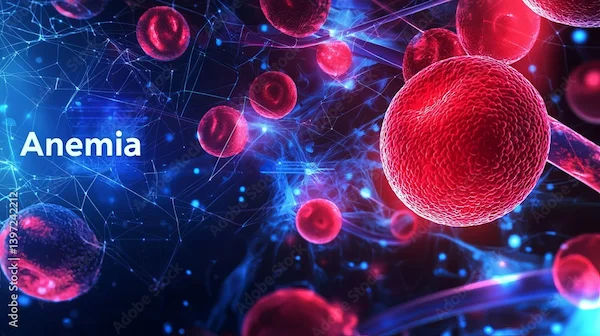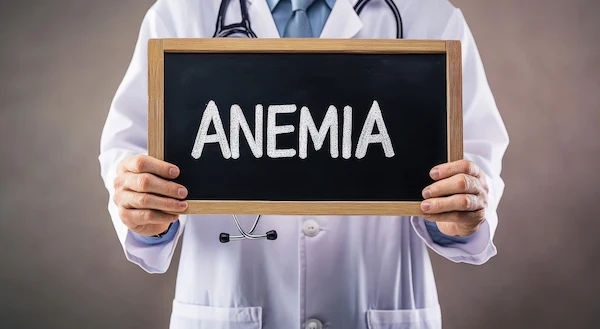Anaemia: Symptoms, Investigations, Treatment And Types Of Anaemia
Learn about Anaemia, its symptoms, causes, diagnostic investigations, and treatment options. Understand how to manage and address this condition effectively.

Written by Dr.Sonia Bhatt
Last updated on 13th Jan, 2026

Introduction
Anaemia is a blood disorder that occurs when you don't have enough red blood cells or when your red blood cells don't function properly. While some types of anaemia are inherited, others can develop or be acquired during a person's lifetime.
Anaemia can impact your life in various ways. Some types have mild symptoms that improve with treatment, while others, particularly inherited forms, may cause lifelong medical issues. Severe anaemia can be life-threatening and may also be a symptom of serious conditions such as cancer. In this article, we will explore the causes, symptoms, and treatment options for anaemia.
Types of Anaemia
There are different types of anaemia which includes:
1. Acquired Anaemia
Acquired anaemias develop during your lifetime, often due to a condition or illness. These include:
Anaemia of chronic disease: Caused by chronic inflammation that makes it difficult for the body to utilise iron needed for red blood cell production.
Autoimmune haemolytic anaemia: The immune system attacks red blood cells.
Macrocytic and megaloblastic anaemia: These occur when the bone marrow produces abnormally large red blood cells, often due to vitamin deficiencies or other medical conditions.
Normocytic anaemia: Characterised by fewer red blood cells than usual, with many possible causes.
Pernicious anaemia: An autoimmune condition that prevents the absorption of vitamin B12, leading to a deficiency.
2. Inherited Anaemia
Inherited anaemias are present at birth and include:
Diamond-Blackfan anaemia: A disorder where bone marrow fails to produce enough red blood cells.
Fanconi anaemia: A rare blood disorder increasing the risk of anaemia and other blood conditions.
Sickle cell anaemia: The red blood cells change shape, causing blockages in blood flow.
Thalassaemia: A genetic disorder that causes the body to produce insufficient haemoglobin, leading to small red blood cells and anaemia.
3. Other Types of Anaemia
Some types of anaemia can be inherited or acquired:
Aplastic anaemia: Occurs when stem cells in the bone marrow fail to produce enough blood cells.
Haemolytic anaemia: Characterised by the rapid breakdown of red blood cells.
Microcytic anaemia: Results from smaller red blood cells due to insufficient haemoglobin, often caused by iron deficiency or other conditions.
Sideroblastic anaemia: Caused by abnormal iron use during red blood cell development.
Symptoms of Anaemia
The symptoms of anaemia depend on the underlying cause and its severity. In some cases, anaemia can be so mild that no symptoms are noticeable initially, but symptoms tend to develop and worsen as the condition progresses.
If anaemia is caused by another illness, the symptoms of that illness may overshadow those of anaemia, making it harder to detect. Certain types of anaemia, however, have symptoms that suggest their specific cause.
Common symptoms of anaemia include:
Tiredness
Weakness
Shortness of breath
Pale or yellowish skin (this may be more noticeable on lighter skin than on Black or brown skin)
Irregular heartbeat
Dizziness or lightheadedness
Chest pain
Cold hands and feet
Headaches
Causes of Anaemia
Anaemia occurs when there is insufficient haemoglobin or red blood cells in the blood.
This can happen if:
The body doesn't produce enough haemoglobin or red blood cells.
Bleeding causes a loss of red blood cells and haemoglobin faster than they can be replaced.
The body destroys red blood cells and the haemoglobin within them.
Risk Factors
Risk factors for anaemia include:
Diet: A lack of essential vitamins and minerals, such as iron, vitamin B12, and folate, can increase the risk of anaemia.
Intestinal issues: Conditions that affect nutrient absorption, such as Crohn's disease and coeliac disease, can raise the risk of anaemia.
Menstrual periods: Heavy menstrual bleeding can lead to a loss of red blood cells, increasing the risk of anaemia.
Pregnancy: Pregnant individuals who don't take a multivitamin with folic acid and iron are at a higher risk of anaemia.
Chronic conditions: Diseases like cancer, kidney failure, and diabetes can lead to anaemia of chronic disease by causing a shortage of red blood cells.
Chronic blood loss: Slow, ongoing blood loss from conditions like ulcers can deplete iron stores, leading to iron deficiency anaemia.
Family history: A family history of inherited anaemia conditions, such as sickle cell anaemia, can increase the risk of developing these types of anaemia.
Other factors: A history of certain infections, blood disorders, autoimmune diseases, excessive alcohol consumption, exposure to toxic chemicals, or certain medications can interfere with red blood cell production and contribute to anaemia.
Age: Individuals over the age of 65 are at an increased risk of anaemia.
Investigations and Diagnosis
Your healthcare provider will begin by asking about your symptoms. As anaemia occurs when there aren’t enough healthy red blood cells, they will conduct blood tests, including:
Complete Blood Count (CBC): This test helps assess all types of blood cells, focusing on red blood cells. Pathologists examine blood samples to count red blood cells and evaluate their size and shape. This test can also check your vitamin B12 or B9 (folate) levels.
Haemoglobin Test: Haemoglobin is the key component of red blood cells. This test is commonly used to detect anaemia.
Hematocrit Test: This test measures the percentage of red blood cells in your blood.
Peripheral Blood Smear: Your red blood cells will be examined under a microscope to assess their size and shape.
Reticulocyte Count: This test measures the number of immature red blood cells (reticulocytes) and helps determine whether your bone marrow is producing enough healthy red blood cells.
Treatment Strategies
Treatment for anaemia depends on its cause. If anaemia is due to an underlying condition, the primary treatment will target that condition, but specific treatments for anaemia may also be needed. These treatments may include dietary supplements or medications.
1. Dietary Supplements
Your doctor may recommend the following supplements for anaemia:
Iron supplements: Available in capsules or tablets, these help increase iron levels.
Folic acid supplements: Vitamin B9 (folate) is vital for red blood cell and DNA production.
Vitamin B12 supplements: These support the production of healthy red blood cells.
2. Medications
Your doctor may prescribe medications, including:
Erythropoietin: A medication that stimulates your bone marrow to produce more blood stem cells.
Immunosuppressants: If anaemia is caused by an autoimmune disorder, immunosuppressive medications may be prescribed to prevent your immune system from attacking red blood cells.
3. Procedures
In some cases, your doctor may recommend:
Blood transfusion: To replace lost red blood cells.
Stem cell (bone marrow) transplant: To replace unhealthy blood stem cells with healthy ones.
Surgery: To treat internal bleeding causing anaemia.
Complications of Anaemia
If left untreated, anaemia can lead to several health complications, including:
Severe fatigue: Severe anaemia can make it difficult to perform daily activities.
Pregnancy complications: Pregnant individuals with folate deficiency anaemia may face a higher risk of complications, such as premature birth.
Heart problems: Anaemia can cause a rapid or irregular heartbeat (arrhythmia), as the heart has to pump more blood to compensate for the lack of oxygen in the blood. This can result in an enlarged heart or heart failure.
Death: Some inherited forms of anaemia, such as sickle cell anaemia, can lead to life-threatening complications. Additionally, significant blood loss leading to severe anaemia can be fatal.
Preventive Measures
While many types of anaemia cannot be prevented, a healthy diet can help prevent iron and vitamin deficiency anaemia. Key dietary elements include:
Iron: Found in beef, meats, beans, lentils, iron-fortified cereals, dark leafy greens, and dried fruit.
Folate: Present in fruits, dark leafy vegetables, peas, kidney beans, peanuts, and enriched grains like bread, pasta, and rice.
Vitamin B-12: Found in meat, dairy, and fortified cereals and soy products.
Vitamin C: Found in citrus fruits, peppers, broccoli, tomatoes, melons, and strawberries, which also aid iron absorption.
When to Seek Medical Advice?
If you experience unexplained fatigue or shortness of breath, or if you're told your haemoglobin levels are low, consult your healthcare provider for further evaluation.
Unexplained tiredness or shortness of breath.
Difficulty completing daily tasks due to fatigue.
Low haemoglobin levels identified during a blood donation or test.
Conclusion
Anaemia is a common condition that can significantly impact your health, ranging from mild fatigue to serious complications. The causes vary, from nutritional deficiencies to chronic diseases or inherited disorders. Early diagnosis and appropriate treatment, including dietary changes, supplements, and sometimes more intensive medical interventions, are essential to managing anaemia effectively. By addressing the underlying causes and seeking medical advice when necessary, many people can live healthy lives despite having anaemia. Always consult a healthcare provider if you notice symptoms or have concerns about your blood health.
Consult Top General Physicians
Consult Top General Physicians

Dr. Vijay Kumar Shrivas
General Physician/ Internal Medicine Specialist
20 Years • MBBS, DNB - General Medicine Internal Medicine
Bilaspur
Apollo Hospitals Seepat Road, Bilaspur
(75+ Patients)

Dr. Mira Govindarajan
General Physician/ Internal Medicine Specialist
24 Years • MD., MHA
Chennai
Apollo Medical Centre Kotturpuram, Chennai

Dr. Indrajit Das
General Physician/ Internal Medicine Specialist
4 Years • "MD (Internal medicine) : Gauhati Medical College and Hospital, Guwahati (2018-2021) MD (Pathology) : Gauhati Medical College and Hospital, Guwahati (2012-2015) MBBS (Bachelor of Medicine, Bachelor of Surgery) : Silchar Medical College, Assam (2003-2008) "
Guwahati
Apollo Excelcare Hospital, Guwahati

Dr. Jagadeesh C
General Physician/ Internal Medicine Specialist
20 Years • MBBS, MD, FRCP, FCCP
Chennai
Apollo Hospitals Greams Road, Chennai
(100+ Patients)

Dr. Senthilmuthu K
General Physician/ Internal Medicine Specialist
6 Years • MBBS, MD
Karur
Apollo Hospitals Allwyn Nagar, Karur
(100+ Patients)
.webp)



.webp)